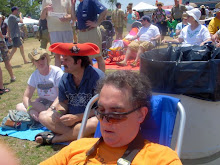A Safer World. . . for Whom?
Rattlerd asked:
Are there any other innovative ideas out there that could address the problems professional juries are put forward to solve? As a CPA and auditor, I was especially distressed at the outcome of the Scrushy/HealthSouth case upon reading some of the jurors' comments that they really didn't understand the prosecution's case because it was too complicated and simply boring. There was evidence in the OJ Simpson trial that at least one juror confused DNA evidence with blood type, and given the increasing complexity of technology I don't see most patent cases can be competently heard if you're not an engineer.
Is this just a problem of perception, and if not, are there no good alternatives?
Thanks,
D.
---------------------------------------
Whenever there is a failure in communication, at least two parties are involved. There is the person attempting to communicate, and the person attempting to understand that which the other party is attempting to communicate.
Perhaps we are blaming the wrong party.
My law school did not offer any courses in communication skills. Nor do most others. There are courses in trial advocacy, certainly. But courses in communication skills? No.
Quoting from the communication failure link, a simple communication effort "can be presented diagrammatically as follows:
idea in A's mind --> a formulated message (e.g. sentence) --> transfer mechanism (e.g. speech and hearing) --> idea in B's mind.
Each transformation (depicted as "-->") brings its own contribution to the probability of a failure."
Thus, some of the reasons for the communications failures are:
1. A doesn't have a clear idea in his mind.
2. A cannot formulate the idea into a coherent message
3. A cannot speak clearly
4. B cannot hear well
5. B cannot understand A's message to create a coherent idea in his mind.
In the case of an attorney presenting evidence through an expert witness, the additional problem is that BOTH the expert and the attorney have to have the same idea in their mind, and be able to formulate it into a coherent message through Q+A.
So, when juries misunderstand what a lawyer is trying to tell them through an expert, who is at fault? Is the problem with the jury being unable to understand, or is the problem with the attorney and/or experts being unable to communicate a coherent message?
I do not think it is a stretch to claim it is more often the latter. We should not reform/deform the jury system to make the world a safer place for incompetent lawyers and their incompetent experts. Instead, we should better understand how to present a clear, coherent message through our witnesses. We do not need better jurors: we need better lawyers, better experts, and - perhaps - better judges.
The best experts are easily capable of explaining their subject to a group of lay persons. The average experts, however, are not. Their understanding tends to be more abstract, and they are less capable of explaining their subject matter in concrete terms that lay people can understand. A good lawyer can assist in this matter, through witness preparation and careful questioning. How many lawyers omit these steps -- then blame the jury afterwards?
The average lawyers never even gain a good understanding of the subject matter they are trying to present through an expert. Some even consider their lack of understanding an asset: they will make the expert explain it until they understand it. But is it explained so well that everyone in the room shares the attorney's comprehension (considering that the attorney had at least some head start on the jury?) Probably not. Again, do we blame the jury for bad lawyering?
Good experts, with relevant visual aids and a coherent, well-planned presentation, can be understood by juries. But so long as mediocre lawyers choose to baffle by BS because they are too lazy to dazzle with brilliance, the results will be predictable.
It goes without saying that few trial judges are CPAs, or have any business or accounting experience or training. There is no reason to believe a trial court judge is any better at understanding complex, technical or scientific evidence than a jury. So trial by judge is no improvement. But do we want specially trained jurors, creating a trial transcript that appellate judges will not be able to comprehend (perhaps finding insufficient evidence as a result?) I don't think so.
There is a problem in allowing people with specialized training to make decisions binding upon society as a whole. As Lord Chesterton noted long ago:
"Our civilization has decided, and very justly decided, that determining the guilt or innocence of men is a thing too important to be trusted to trained men. [When it] wishes for light upon that awful matter, it asks men who know no more law than I know, but who can feel the things that I felt in the jury box. When it wants a library catalogued, or the solar system discovered, or any trifle of that kind, it uses up its specialists. But when it wishes anything done which is really serious, it collects twelve of the ordinary men standing around. The same thing was done, if I remember right, by the Founder of Christianity."
G.K. Chesterton, Tremendous Trifles, 67-68 (1910)
Instead of changing the qualifications for jury duty, we should change the qualifications for getting a law license and/or graduating from law school to better reflect the demands upon real-world lawyers. An IRAC spouting parrot who is incapable of communicating may make a fine engineer. Don't expect him to be a persuasive trial lawyer.

